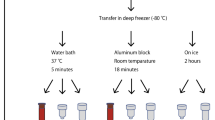Abstract
The isolation of DNA from whole blood by a modified rapid method (RM) was tested using various detergents and buffer conditions. Extraction of DNA with either NP-40 or Triton X-100 gave a high yield of undegraded DNA in less than an hour. The concentration of magnesium ion in the buffers was critical to obtaining intact, high molecular weight (HMW) DNA. Greater than 10 mM MgCl2 led to degradation. Addition of EDTA to the buffer inhibits this degradation. Preparation of DNA from blood stored at room temperature or incubated at 37°C for 24 hr resulted in the same amount and quality of DNA as from samples frozen at −70°C. DNA from blood samples that had undergone more than four freeze-thaw cycles was found to be partially degraded. The modified RM can be applied to extract DNA from as little as 10 µl of blood (340 ng of DNA) and from dried blood samples. DNA samples remained intact and undegraded for longer times when DNA was dissolved in higher concentrations of EDTA.
Similar content being viewed by others
References
Anderson, W. F. (1992). Human gene therapy.Science 256808.
Douglas, A. M., Georgalis, A. M., Benton, L. R., Canavan, K. L., and Atchi, B. A. (1992). Purification of human leucocyte DNA: Proteinase K is not necessary.Anal. Biochem. 201362.
Lahiri, D. K., and Nurnberger, J. I., Jr. (1991). A rapid non enzymatic method for the preparation of HMW DNA from blood for RFLP studies.Nucleic Acids Res. 195444.
Lahiri, D. K., Bye, S., Nurnberger, J. I., Jr., Hodes, M. E., and Crisp, M. (1992). A non-organic and non-enzymatic extraction method gives higher yields of genomic DNA from whole blood samples than do nine other methods tested.J. Biochem. Biophys. Meth. 25193.
McCabe, E. R. B., Huang, S.-Z., Seltzer, W. K., and Law, M. L. (1987). DNA microextraction from dried blood spots on filter paper blotters: potential applications to newborn screening.Hum. Genet. 75213.
Madisen, L., Hoar, D. I., Holroyd, C. D., Crisp, M., and Hodes, M. E. (1987). DNA Banking: The effects of storage of blood and isolated DNA on the integrity of DNA.Am. J. Med. Genet. 27379.
Maniatis, T., Fritsch, E. F., and Sambrook, J. (1982).Molecular Cloning: A Laboratory Manual Cold Spring Harbor Laboratory, Cold Spring Harbor, NY.
Miller, A. D. (1992). Human gene therapy comes of age.Nature 357455.
Miller, S. A., Dykes, D. D., and Polesky, H. F. (1988). A simple salting out procedure for extracting DNA from human nucleated cells.Nucleic Acids Res. 161215.
Saiki, R. K., Bugawan, T. L., Horn, G. T., Mullis, K. B. and Erlich, H. A. (1986). Analysis of enzymatically amplified β-globin and HLA-DQα DNA with allele-specific oligonucleotide probes.Nature 324163.
Author information
Authors and Affiliations
Additional information
This work was supported by grants from the Indiana Department of Mental Health and PHS RO1 AG10297.
Rights and permissions
About this article
Cite this article
Lahiri, D.K., Schnabel, B. DNA isolation by a rapid method from human blood samples: Effects of MgCl2, EDTA, storage time, and temperature on DNA yield and quality. Biochem Genet 31, 321–328 (1993). https://doi.org/10.1007/BF00553174
Received:
Revised:
Issue Date:
DOI: https://doi.org/10.1007/BF00553174




